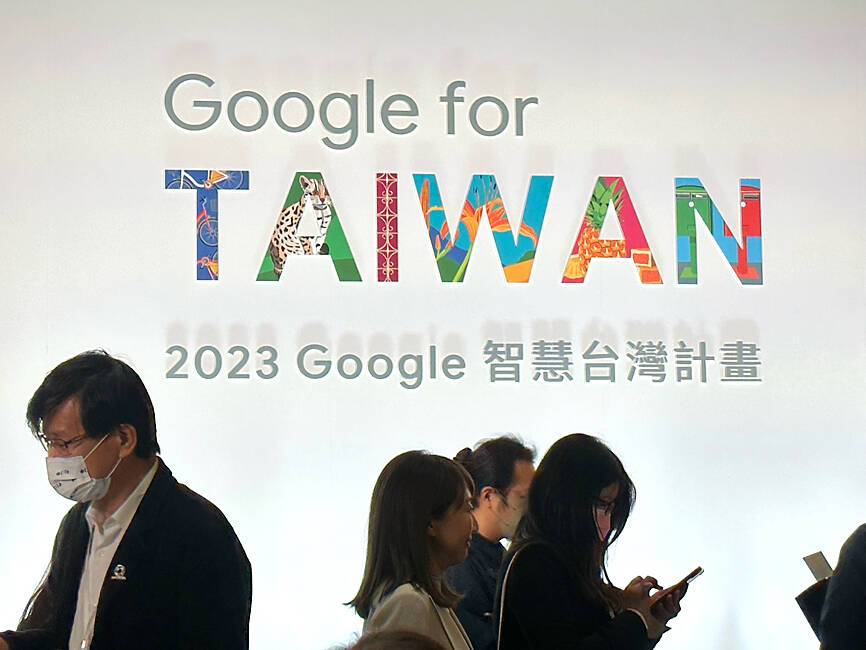Google yesterday launched a NT$300 million (US$9.74 million) fund to facilitate the digital transformation of the news industry in Taiwan, with the US tech company expected to hold a second round of talks with local media outlets to address the issue of sharing revenue with publishers.
The launch of the Taiwan News Digital Co-prosperity Fund came after the first round of talks between Google, Taiwanese media outlets and a cross-ministerial task force led by the Ministry of Digital Affairs wrapped up, Deputy Minister of Digital Affairs Lee Huai-jen (李懷仁) told a news conference in Taipei.
“We are glad that the first round of talks has yielded this result,” Lee said. “This is the first step. We believe more progress will be made going forward... We want to see more collaborations between Google and news outlets through more talks.”

Photo: CNA
The ministry welcomes the initiative from Google and supports local publishers’ call for technology companies to pay publishers for linking to their content, Lee said.
The ministry stands by its statement that resorting to legislation to regulate the payment of news content is “always an option,” he added.
A new round of negotiations is set to take place later this month, Lee said.
Facebook owner Meta Platforms Inc has also approached the ministry to introduce a similar program, Lee said in response to a reporter’s question.
The Taiwan News Digital Co-prosperity Fund, tailor-made for the local news industry, is “an innovative initiative and a new model to support the digital future and prosperity of the local news ecosystem,” Michaela Browning, Google vice president of government affairs and public policy in Asia Pacific, told the news conference.
“It will provide N$300 million in three years to support publishers to strengthen their digital capabilities, expand their reach and improve organization’s engagement,” Browning said.
The Digital Transformation Association, which helps manage the fund, said it would start accepting applications in May.
As Google has introduced a similar initiative in the EU, it might provide a model for the association to run the fund in Taiwan, the group said.
Google said Taiwan plays a substantial role in assisting the company in developing new hardware, making Taiwan the biggest hardware development center only after its US headquarters.
Google plans to launch a second hardware development center soon, Tina Lin (林雅芳), managing director of sales and operations at Google Taiwan, told the news conference.
The construction of the center in New Taipei City’s Banciao District (板橋) was delayed by the COVID-19 pandemic, she said.
Google also plans to introduce the company’s first semiconductor research program to Taiwan later this year, Lin said. Students from four local universities will be involved in this program, she said.
Minister of Digital Affair Audrey Tang (唐鳳) told reporters on the sidelines of a meeting at the legislature’s Transportation Committee that the fund is “a welcome development,” and confirmed that Meta is formulating a similar plan.
“Establishing a fund is a relatively achievable goal for digital platforms, compared with mandatory bargaining with news media outlets over pricing of news content, as is done in Australia,” Tang said.

RUN IT BACK: A succesful first project working with hyperscalers to design chips encouraged MediaTek to start a second project, aiming to hit stride in 2028 MediaTek Inc (聯發科), the world’s biggest smartphone chip supplier, yesterday said it is engaging a second hyperscaler to help design artificial intelligence (AI) accelerators used in data centers following a similar project expected to generate revenue streams soon. The first AI accelerator project is to bring in US$1 billion revenue next year and several billion US dollars more in 2027, MediaTek chief executive officer Rick Tsai (蔡力行) told a virtual investor conference yesterday. The second AI accelerator project is expected to contribute to revenue beginning in 2028, Tsai said. MediaTek yesterday raised its revenue forecast for the global AI accelerator used

Taiwan Semiconductor Manufacturing Co (TSMC, 台積電) has secured three construction permits for its plan to build a state-of-the-art A14 wafer fab in Taichung, and is likely to start construction soon, the Central Taiwan Science Park Bureau said yesterday. Speaking with CNA, Wang Chun-chieh (王俊傑), deputy director general of the science park bureau, said the world’s largest contract chipmaker has received three construction permits — one to build a fab to roll out sophisticated chips, another to build a central utility plant to provide water and electricity for the facility and the other to build three office buildings. With the three permits, TSMC

TEMPORARY TRUCE: China has made concessions to ease rare earth trade controls, among others, while Washington holds fire on a 100% tariff on all Chinese goods China is effectively suspending implementation of additional export controls on rare earth metals and terminating investigations targeting US companies in the semiconductor supply chain, the White House announced. The White House on Saturday issued a fact sheet outlining some details of the trade pact agreed to earlier in the week by US President Donald Trump and Chinese President Xi Jinping (習近平) that aimed to ease tensions between the world’s two largest economies. Under the deal, China is to issue general licenses valid for exports of rare earths, gallium, germanium, antimony and graphite “for the benefit of US end users and their suppliers

Dutch chipmaker Nexperia BV’s China unit yesterday said that it had established sufficient inventories of finished goods and works-in-progress, and that its supply chain remained secure and stable after its parent halted wafer supplies. The Dutch company suspended supplies of wafers to its Chinese assembly plant a week ago, calling it “a direct consequence of the local management’s recent failure to comply with the agreed contractual payment terms,” Reuters reported on Friday last week. Its China unit called Nexperia’s suspension “unilateral” and “extremely irresponsible,” adding that the Dutch parent’s claim about contractual payment was “misleading and highly deceptive,” according to a statement